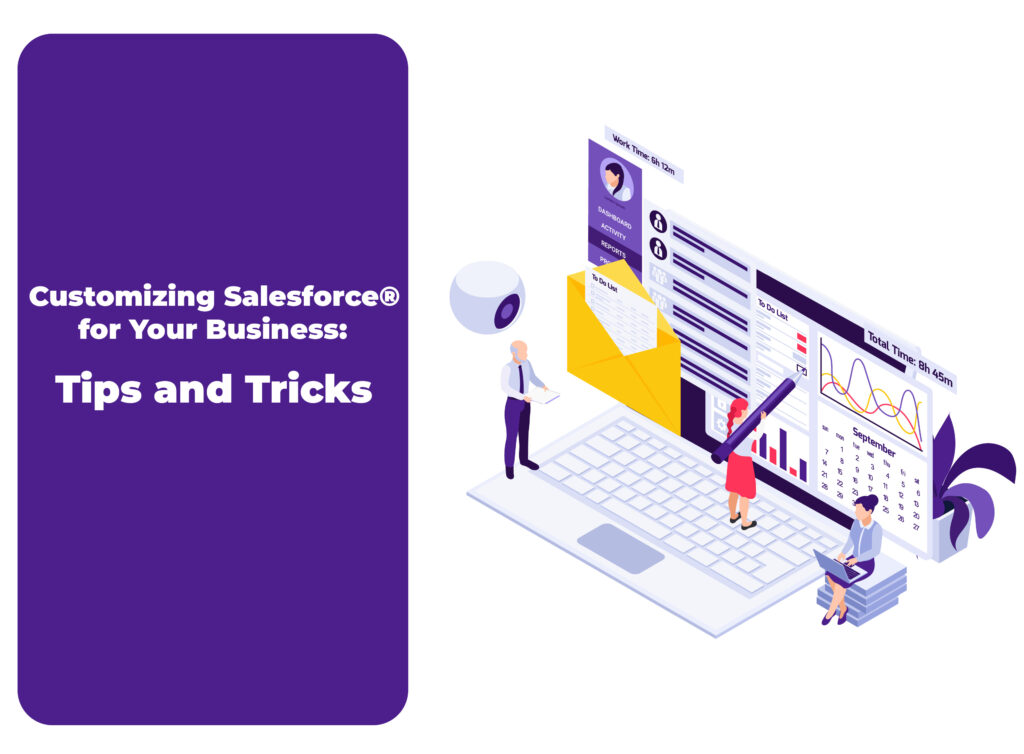Customizing Salesforce® for Your Business: Tips and Tricks

Salesforce® is a powerful CRM platform that can be customized to meet the unique needs and workflows of your business. With its extensive customization capabilities, you can tailor Salesforce to match your specific requirements, optimize processes, and enhance user experience. However, navigating the customization options can be overwhelming without proper guidance. In this blog, we will share valuable tips and tricks to help you effectively customize Salesforce for your business and maximize its potential.
1. Clearly Define Your Customization Objectives:
Before diving into customization, clearly define your objectives and understand the specific pain points and requirements you want to address. Identify the key areas where customization is needed, such as sales processes, customer service workflows, or marketing automation. By having a clear understanding of your customization goals, you can prioritize your efforts and ensure that the customizations align with your business objectives.
2. Leverage Standard Salesforce Features:
Salesforce provides a wide range of standard features and functionalities that can meet many of your business needs. Before exploring customizations, thoroughly explore the standard Salesforce capabilities. Familiarize yourself with standard objects, workflows, validation rules, reports, and dashboards. By leveraging these standard features, you can minimize the need for complex customizations and take advantage of the platform's built-in functionality.
3. Custom Objects and Fields:
Custom objects and fields allow you to capture and organize data specific to your business processes. When creating custom objects, carefully define the data model and relationships to ensure efficient data management. Customize field types, validation rules, and page layouts to match your data requirements. Consider using dependent picklists, lookup relationships, or formula fields to automate data entry and improve data accuracy.
4. Workflow Automation:
Salesforce offers powerful workflow automation tools, such as Process Builder and Workflow Rules, that allow you to automate repetitive tasks and streamline business processes. Take advantage of these tools to automate approval processes, trigger email notifications, update record fields, and perform other actions based on predefined criteria. Workflow automation can save time, improve efficiency, and reduce manual errors.
5. Page Layouts and Record Types:
Customize page layouts and record types to provide a tailored user experience for different user profiles and business scenarios. By creating multiple page layouts and record types, you can display relevant fields, related lists, and actions based on specific user roles or record attributes. This ensures that users see the most relevant information and have access to the appropriate functionality, improving their productivity and user adoption.
6. Reports and Dashboards:
Salesforce's reporting and dashboard capabilities allow you to gain valuable insights into your business data. Customize reports and dashboards to visualize key metrics, track performance, and monitor business trends. Utilize report filters, groupings, and formulas to generate meaningful reports. Design intuitive dashboards with charts, graphs, and tables to provide real-time visibility into your business performance.
7. Integration with External Systems:
Integrating Salesforce with other systems, such as marketing automation platforms, ERP systems, or customer support software, can enhance data flow and streamline processes. Leverage Salesforce's integration capabilities, such as APIs or pre-built connectors, to exchange data seamlessly between Salesforce and external systems. Integration eliminates data silos and enables a holistic view of your customer interactions and business operations.
8. AppExchange and Custom App Development:
Explore the Salesforce AppExchange, an extensive marketplace of pre-built applications and solutions, to extend the functionality of your Salesforce instance. You may find third-party apps that address your specific business needs, saving time and effort on custom development. If required, consider custom app development using Salesforce's low-code or no-code development tools, such as Lightning App Builder or Salesforce App Development. Custom apps can provide unique functionalities and workflows tailored to your business processes.
Ready to unlock the full potential of Salesforce? Request a proposal from Paramyter.tech and let our experts guide you towards success. Click here to get started!
For Latest News & Update
Want Receive the Best Salesforce Insights? Subscribe Now!
We can help you to create your CRM for better business revenue.